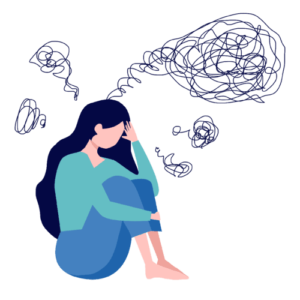
rTMS OCD Assessment
Answer these simple questions to understand more about rTMS OCD Assessment. We share instant results and keep your information confidential.

What is rTMS OCD Assessment?
Repetitive Transcranial Magnetic Stimulation (rTMS) is a non-invasive neuromodulation technique used to assess and treat Obsessive-Compulsive Disorder (OCD). It involves delivering magnetic pulses to specific brain areas to modulate neural activity. rTMS OCD assessment entails mapping brain regions associated with OCD symptoms and determining optimal stimulation parameters for potential therapeutic use. By observing changes in symptom severity and brain activity, clinicians can tailor rTMS treatment for individuals with OCD, offering a targeted approach to managing their condition.
Who can benefit from this rTMS OCD Assessment?
Individuals diagnosed with Obsessive-Compulsive Disorder (OCD) who have not responded well to traditional treatments like medication or psychotherapy may benefit from rTMS OCD assessment. This approach could be particularly useful for those experiencing severe or treatment-resistant OCD symptoms. By identifying specific brain regions linked to OCD and tailoring the stimulation parameters accordingly, rTMS assessment offers a potential avenue for personalized and more effective treatment. However, the suitability of rTMS assessment should be determined through thorough clinical evaluation by a mental health professional.


rTMS OCD Assessment Accuracy
The accuracy of rTMS OCD assessment depends on various factors, including the precision of brain mapping, individual brain variability, and the expertise of the clinicians conducting the assessment. While rTMS can provide valuable insights into brain activity related to OCD, its accuracy is not absolute and can vary. It’s essential to consider rTMS assessment as a complementary tool alongside clinical evaluation and other diagnostic methods. Collaborative efforts between experienced professionals and advanced technology contribute to enhancing the overall accuracy of rTMS in assessing OCD-related neural patterns.
Types of rTMS OCD Assessment
Resting-State Functional Connectivity (rsFC)
This assessment involves measuring the connectivity between different brain regions while the patient is at rest. By analyzing the synchronization of neural activity, it helps identify networks involved in OCD symptoms.
Task-Based Functional Magnetic Resonance Imaging (fMRI):
Patients perform specific tasks during fMRI scans to study how their brain responds. This can help pinpoint regions associated with OCD symptoms and their cognitive processes.
Structural MRI:
Structural imaging assesses the anatomy of the brain, identifying any structural abnormalities or differences in brain regions linked to OCD.
Neuropsychological Testing:
This involves various cognitive tests to evaluate specific cognitive functions and their potential connection to OCD symptoms.
Neurostimulation Mapping:
This assesses the effects of rTMS on targeted brain areas related to OCD symptoms, helping to determine optimal stimulation parameters for potential therapeutic use.
Clinical Assessment:
Combining rTMS assessments with clinical evaluations helps ensure a comprehensive understanding of the patient’s condition and tailor treatment accordingly.
Handling Anxiety Issues
Handling rTMS (Repetitive Transcranial Magnetic Stimulation) for OCD (Obsessive-Compulsive Disorder) involves a systematic approach to ensure safe and effective treatment:
- Professional Expertise: Seek treatment from experienced and qualified medical professionals who specialize in rTMS and OCD. Their expertise ensures proper assessment, protocol development, and monitoring.
- Comprehensive Evaluation: Undergo a thorough assessment to determine the suitability of rTMS for your condition. This may involve clinical interviews, psychological assessments, and brain imaging.
- Customized Treatment: Treatment protocols should be tailored to your specific OCD symptoms and brain activity patterns identified through assessments.
- Monitoring and Adjustment: Regularly monitor your progress during rTMS sessions. Adjust stimulation parameters if necessary to achieve optimal results.
- Collaboration: Maintain open communication with your treatment team. Provide feedback on changes in symptoms and any concerns you may have.
- Safety and Comfort: Ensure your safety and comfort during sessions. rTMS is generally well-tolerated, but report any discomfort or adverse effects to your medical team.
- Integration with Therapy: rTMS is often used in conjunction with psychotherapy. Combining treatments can enhance outcomes by addressing both neural activity and psychological aspects of OCD.
- Patience: Results may take time. Be patient and realistic about the timeline for improvements.
- Follow-Up: Continue follow-up appointments after the treatment course to assess the persistence of benefits and make any necessary adjustments.
- Lifestyle and Self-Care: Maintain a healthy lifestyle with proper sleep, nutrition, exercise, and stress management. These factors can support the overall effectiveness of treatment.
- Emergency Plan: If you experience worsening symptoms or have thoughts of harming yourself, have a plan in place to contact your healthcare provider or a mental health crisis helpline.
Remember that the success of rTMS for OCD varies among individuals. Working closely with your treatment team and adhering to their guidance is essential for achieving the best possible outcomes.